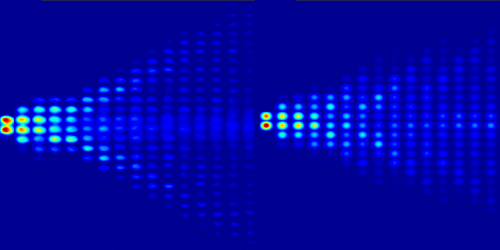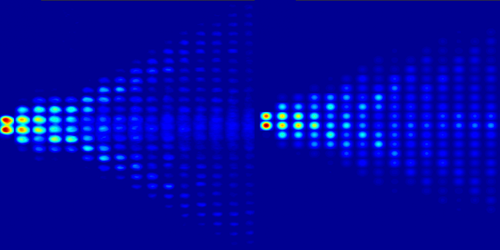Quantum Walk in a Bose-Einstein Condensate
Quantum analogs of a random walk lie at the heart of proposed search algorithms for quantum computers. These quantum walks are more complex than their classical counterparts because entanglement and interference among the particles come into play. Now, Gil Summy of Oklahoma State University in Stillwater and colleagues have carried out a quantum walk by manipulating the momenta of atoms in a Bose-Einstein condensate.
In previous demonstrations of quantum walks, the “walkers” were atoms or photons moving in real space. This new work is the first demonstration of a walk in momentum space—every step of the walk corresponds to a discrete change in the walker’s momentum, rather than in its position. Such a momentum-space walk is easier to control than a real-space walk. In this experiment, the walkers are ultracold rubidium atoms. A step in the walk is initiated by a microwave pulse that puts the atoms into a superposition of two hyperfine states. Then, an optical pulse “kicks” the atoms, changing each atom’s momentum by a discrete amount and in a direction that depends on the atom’s internal state. As the walk proceeds through multiple steps, the researchers track changes in the overall momentum distribution.
A Gaussian distribution would be expected for a classical walk. Instead, the authors observe that the momentum distribution evolves to be centered around two peaks that separate as the walk proceeds—a telltale sign of a quantum walk. By tailoring the microwave and optical pulses, the team also shows that they can steer and even reverse the walk, demonstrating a large degree of control that could be useful both in search algorithms and in fundamental tests of quantum mechanics.
This research is published in Physical Review Letters.
–Christopher Crockett
Christopher Crockett is a freelance writer based in Arlington, Virginia.





